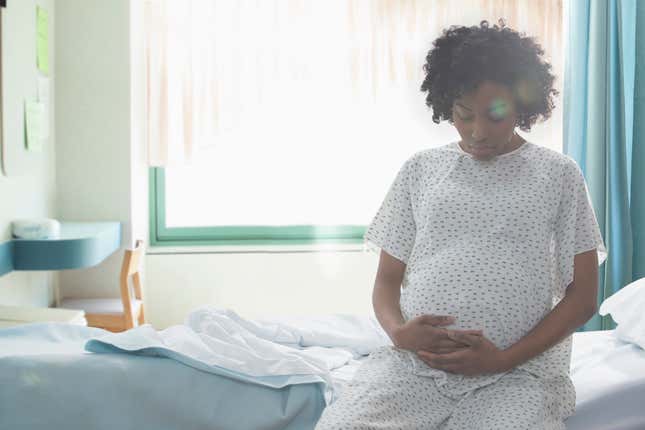
There was nothing Dr. Nisha Verma, an OBGYN based in Atlanta, could do when one of her patients’ water broke at 15 weeks – ending any chance at a healthy birth, but wait.
This was well before the Supreme Court overturned Roe v. Wade. But that hadn’t stopped lawmakers in Georgia from passing rapid fire abortion restrictions – including a mandatory waiting period that required patients to wait 24 hours after receiving counseling before they could get an abortion.
So despite her patient making the decision to go ahead with surgery to remove the non-viable fetus, Verma says they were forced to spend the next 24 hours hoping the delay wouldn’t cause the patient to get an infection – a risk of delaying abortion care at this stage.
Pregnant people, and especially Black pregnant people, are now at even greater risk since the Supreme Court overturned Roe v. Wade — releasing anti-abortion states to pass sweeping bans, like the six week abortion ban in Georgia, says Verma.
And she says that the narrow exceptions for abortion care to save a patient’s life aren’t enough to keep pregnant people safe.
“It’s very unclear to doctors practicing on the ground how sick is sick enough,” says Verma. “It’s really counterintuitive for us to have to wait for our patients to have to get sick before we can intervene. But that’s what these laws force us to do. And it absolutely affects maternal outcomes.”
Research from the University of Colorado Boulder looking at what would happen if abortion was completely banned in Georgia found that maternal mortality rates would go-up by 29 percent.
Unsurprisingly this isn’t just a Georgia problem. The same research found that if no abortions were to occur nation-wide maternal mortality rates would increase by 24 percent overall and a staggering 39 percent for Black women.
“It is deadlier to stay pregnant than it is to have an abortion,” says Amanda Stevenson, who authored the report. “And the degree to which it is deadlier is so substantial that there’s just no ambiguity there.”
When Stevenson looked into banning abortion’s impact on Black maternal mortality rates, she noticed that not only did Black maternal mortality rates increase, but so did the disparities between white and Black maternal health outcomes.
“So that means that the disproportionately high rates of maternal death experienced by Black people are even more disproportionately high,” said Stevenson.
In 2020, the maternal mortality rate for non-Hispanic Black women was 55.3 deaths for 100,000 live-births, according to the CDC, which is nearly 3 times as high as the maternal mortality rate for non-Hispanic white women.
It’s worth noting that the United States is a massive outlier among its economic peers. A report from the Commonwealth Fund, found that the maternal mortality rate in the United States is more than three times the rate in ten other similarly economically prosperous countries – including the UK, France, and Germany.
“The maternal mortality crisis and the current reproductive health care crisis mimic each other in that once again, the greatest harm will fall on communities of color, people without robust financial resources, and people who live in rural areas,” says Jen Villavicencio, lead for equity transformation at the American College of Obstetrics and Gynecology.
Villavicencio, an OBGYN specializing in complex family planning, says that the Supreme Court’s decision to overturn Roe will exacerbate the maternal health crisis.
“It is a horrifying prospect that many more individuals could die because they will be forced to remain pregnant against their will,” Villavicencio, “or needlessly suffer untreated pregnancy complications as clinicians and institutions grapple with what constitutes a lawful medical exception.”
Dr. DeShawn Taylor, an OBGYN who manages a reproductive health care clinic in Phoenix, Arizona, says that it’s not enough to talk about abortion when we talk about why these bans are so devastating for Black Americans.
“Talking in isolation about Black women’s access to abortion is such a narrow lens,” says Taylor. “We’re not addressing why Black women have an increased risk of dying from pregnancy. And so yes, Black women need access to abortion, but also Black women need access to health care.”
Things like food insecurity, housing insecurity, transportation costs, and environmental hazards all impact Black pregnant people’s ability to have healthy pregnancies, says Taylor.
“You put on top of that racism,” says Taylor. “Both with healthcare providers and systemic. And we get a powderkeg of this exponential increase in risks compared to our counterparts.”
Abortion bans are only going to exacerbate the problem, says Taylor.
“When we were saying that abortion bans harm all pregnant people, it wasn’t just a slogan,” Taylor says. “We’re starting to see it playing out across the country now… it’s putting people’s health at risk.”

